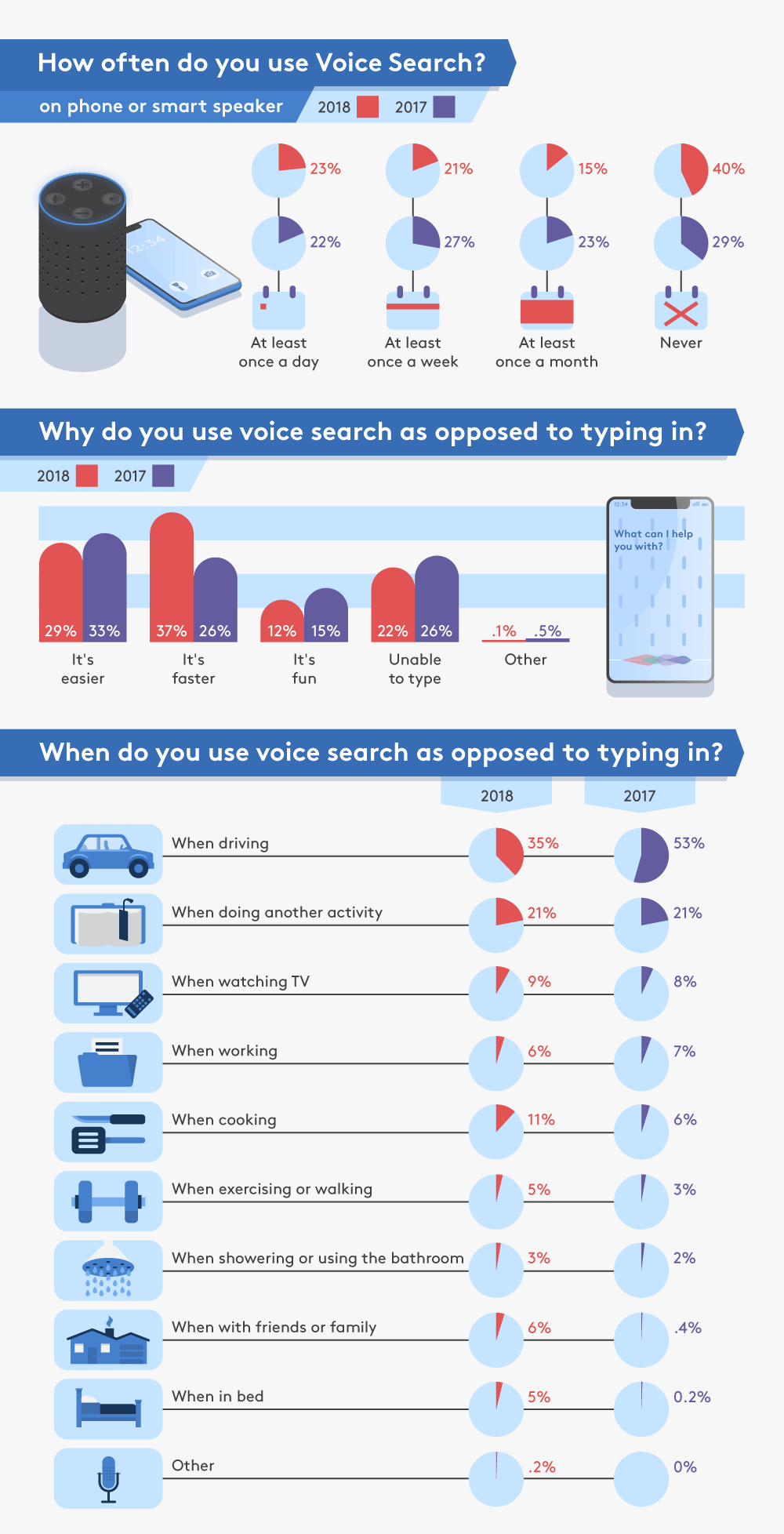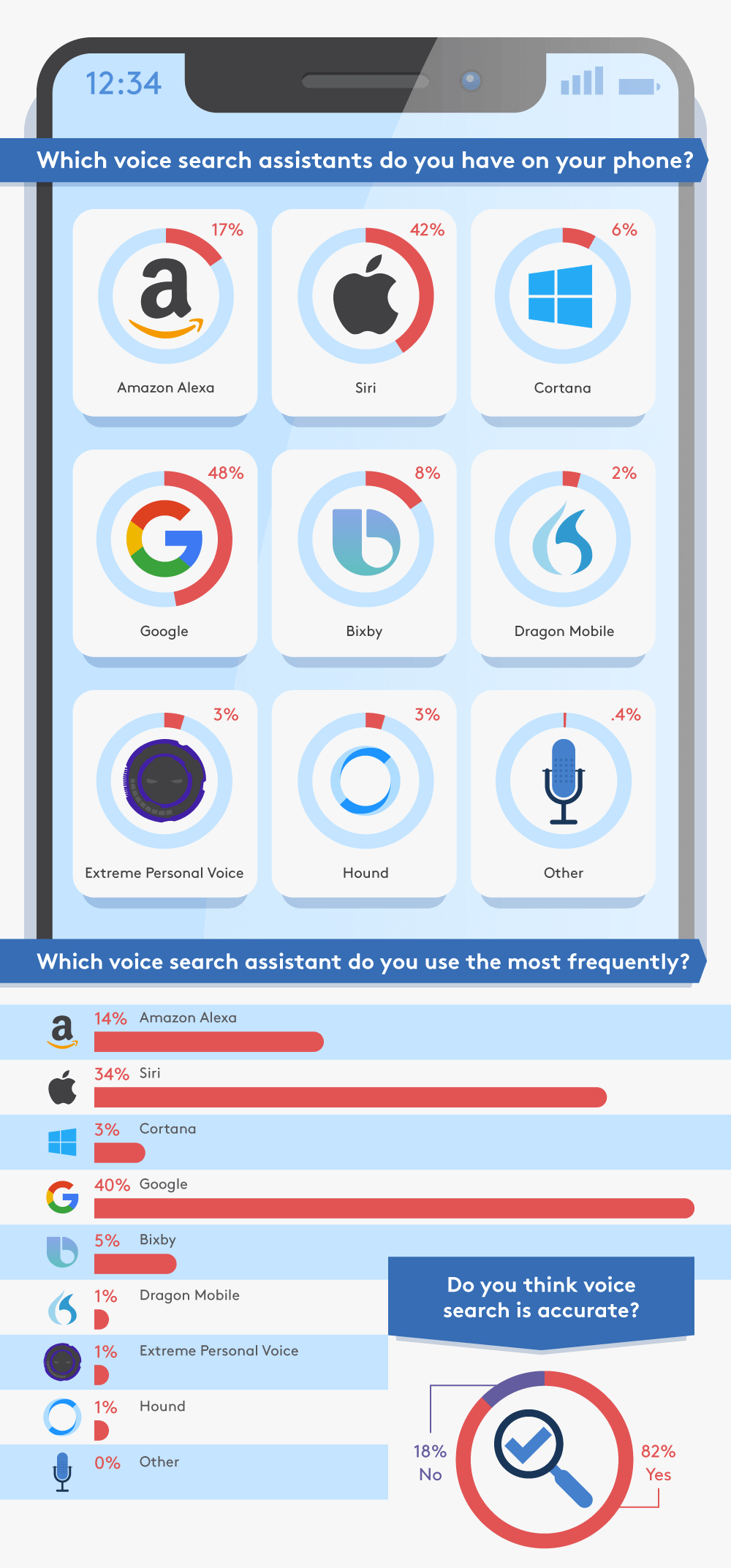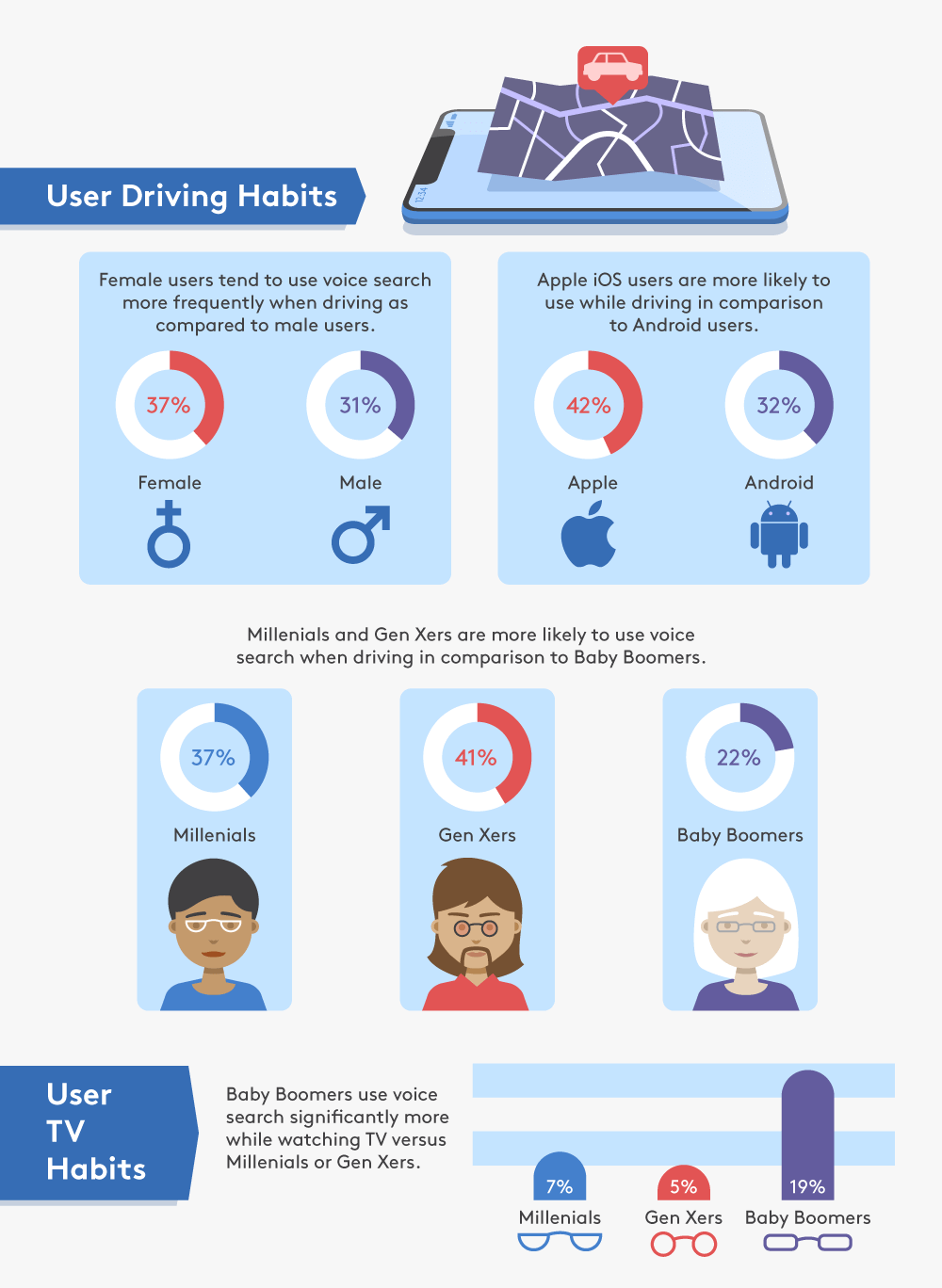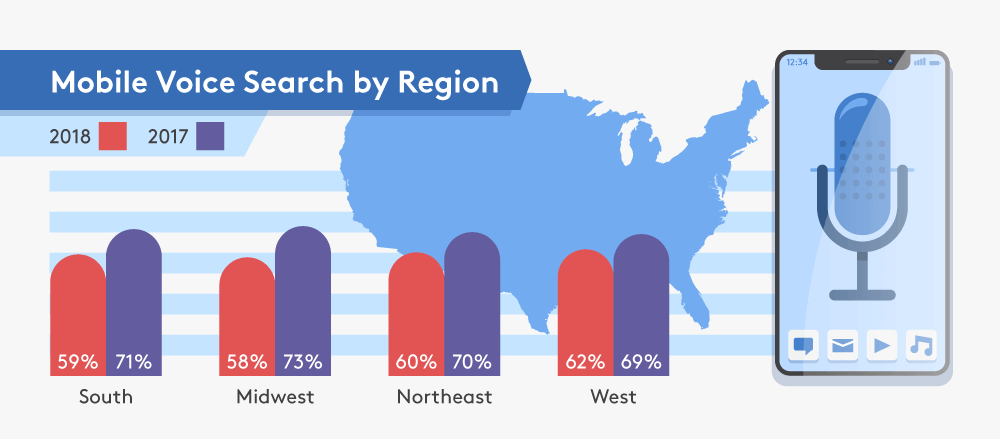How Popular is Voice Search?
Editor’s Note: This post was originally published in February of 2017 and has been updated for accuracy and comprehensiveness.
“Hey Siri (or Alexa, Google, or Cortana), can you tell me what the weather will be like today?”
Every year, the functionality of voice search assistants evolves. Whether it’s a smartphone, tablet, stand-alone beacon (like Amazon Echo), or even your refrigerator, these personal AI assistants are here to help in all kinds of ways. From the weekly weather forecast to turning on the lights in your kitchen or ordering a pizza, the opportunities with voice search programs are turning out to be endless.
With growing functionality and increased presence in our smartphones, we wanted to know how many people are regularly using mobile voice search commands, which AI systems are the most popular, and what exactly people are using them to search. Want to know what trends we uncovered? Read on to find out.
Voice Search Stats

There was no clear winner for preference when it came to frequency of using voice-automated search options. In fact, according to the more than 2,000 people surveyed, roughly 40 percent said they never use it. In 2017, that number was only 28.7 percent, suggesting that for some, the novelty of voice search has worn off. Despite household automated search products like Amazon Echo being breakout trends at the 2017 CES show in Las Vegas, many users are still not using mobile voice search, regardless of its upgrades or conveniences.
Still, voice search has earned some loyal fans. Although the number of once-a-month users has decreased from 23 to 15.45 percent over the last year, the percentage of more frequent users has held fairly steady. Over 21 percent of respondents in 2018 said they use voice search at least once a week, while nearly 23 percent use it every day (compared to nearly 26.7 percent and 21.6 percent in 2017, respectively). As we’ll explore below, usage trends are emerging among different age groups, helping us understand not just who’s using voice search but why.
In asking our 2,000 participants why they chose to use mobile voice search, over 29 percent thought it was easier than manually searching for answers. About 22 percent used voice search because they weren’t able to look at their phones. Further, when we asked when they used it, over 34 percent of participants said they put voice search to the test when they were driving. Another 21 percent said they used it when they were preoccupied with another activity. For users who take the time to know their integrated voice assistants a little more personally, they can be time savers in the end.
Finally, over 37 percent said they thought it was faster than using mobile browsers or other resources — compared to only 25.7 percent in 2017 — while nearly 82 percent thought voice search was accurate.
The Voice Battle Continues

Many of our users had a voice search assistant built into their smartphones. Depending on which phone manufacturer you’re committed to, you might be more familiar with Google Assistant or Apple’s Siri. Over 90 percent of respondents had one or both of these programs on their phone, while nearly 76 percent listed Google Assistant or Siri as the voice search program they favor. In both cases, Google Assistant seems to have gained a slight edge over Siri.
Other less popular assistants included Microsoft’s Cortana, Amazon’s Alexa, and Samsung’s Bixby. Of these, Alexa (the digital assistant of Amazon Echo), is by far the most popular option. Nearly 17 percent of respondents reported having Alexa on their phone, and nearly 14 percent identified Alexa as the voice assistant they use most.
At the 2017 CES show in Las Vegas, Echo earned critical praise for its evolved home integrations and voice search capabilities. According to our research in 2017, around 92 percent of our respondents felt Alexa was accurate, while 93 percent of Cortana users and nearly 91 percent of Google Assistant users found their voice assistants to be accurate. At the bottom was Apple’s Siri — only 82 percent of users thought it was accurate.
Alexa was still at the top of the list in 2018, but users were less satisfied across the board — perhaps because users are beginning to expect more from their voice assistants. Still, a respectable 88 percent thought Alexa was accurate in 2018. Google Assistant jumped to second place, with 87 percent of users finding it accurate. Siri and Cortana rounded out the list at 77 and 74 percent, respectively.
Common Voice Assistant Commands

With users capitalizing on moments where they might have otherwise been preoccupied with other tasks (like driving, watching TV, or cooking), the most popular request of voice search services in 2017 was to play music. Whether you’re in the car and want to hear a certain tune or tidying up around the house and need some music to pass the time, asking that invisible someone in your smartphone to find the perfect tune might be the ultimate convenience.
Playing music is still a popular voice command in 2018, with over 35 percent of respondents using it regularly. However, even more users — over 40 percent — ask their voice assistant for directions. Nearly 33 percent ask for the weather forecast, while over 23 percent use their voice assistant to search for local businesses.
Speaking of convenience, over 17 percent of survey participants regularly use voice search to help them set, cancel, or manage their alarms. Asking Siri or Google to play a catchy song is one thing, but getting them to turn on your alarm when you’re already in bed means not having to get up or double-check that it’s set. Nearly 10 percent use voice search to add or manage appointments and events in their calendar.
Other popular commands included looking up a contact number (nearly 22 percent) and finding recipes (nearly 18 percent). Around 14 percent of respondents use their voice assistant for each of the following tasks:
- Looking up measurement conversions.
- Asking for a sports score.
- Checking traffic alerts.
- Reviewing news headlines.
- Performing a calculation.
Our research also shows that people are having more fun with their voice assistants in 2018. Last year, only 9 percent reported using voice search to ask fun questions; this year, that number is nearly 36 percent. Women and millennials are each about 7 percent more likely than their male or baby boomer counterparts to make use of this feature. Silly questions might seem, well, a bit silly, but where else can you get entertainment like this with no cost?
Voice Search, by Generation

In 2017, millennials were more likely to put their personal AI assistants to task with nearly as many common search phrases as Gen Xers and baby boomers combined. However, it appears baby boomers and Gen Xers have caught up over the last year. Our 2018 survey found no significant difference in the top voice commands by gender or age.
That doesn’t mean every generation uses voice search in the exact same way, though. The order of which commands are most popular does vary slightly between age groups. Gen Xers are the most likely to ask for directions, for instance, while baby boomers are the most likely to search for a local business.
Millennials, meanwhile, are far more likely than either group to use voice search to manage their schedules. Over 20 percent have used it to set or manage an alarm, compared to roughly 13 percent of Gen Xers and 5 percent of baby boomers. For managing calendar events and appointments, those numbers are over 14 percent, nearly 9 percent, and nearly 6 percent, respectively.
Some surprising similarities exist, too. Baby boomers and millennials are almost equally likely to use voice search to find recipes, and both are more likely to do so than Gen Xers are.
Voice Search, by Gender
Our research also showed slight differences in how men and women use their voice search programs.
For both genders, the top use was asking for directions. However, women seem to use this function more than men, with roughly 42.5 percent of women and 37 percent of men asking their voice assistance for directions regularly. Women were also more likely to search for recipes, look up measurement conversions, and look up contact numbers. As you might expect, men are more likely to ask for a sports score — 18.71 percent versus 11.61 percent. Otherwise, the genders were roughly equal in their use of popular commands.
Voice Search, by Region

In 2017, the U.S. didn’t entirely agree with the use of voice search assistants. According to our survey, those in the Midwest were more likely to use voice search — with more than 73 percent of respondents using it at least occasionally in states like Michigan, Illinois, and Ohio.
While the South had only a slightly lower average usage than those in the Northeast, it was states in the West that acknowledged using voice search the least. Despite California and Washington being home to some major tech headquarters, only 69 percent of users from this part of the U.S. put voice search to work for them.
In 2018, the gaps between these four regions have narrowed. Additionally, usage has dropped across the board. Where 70 percent of Southerners reported using it at least once a month in 2017, nearly 59 percent claim to do so in 2018. Usage in the Midwest, meanwhile, has dropped to nearly 58 percent. Numbers in the Northeast and West sit at roughly 60 percent and 62 percent, respectively.
The Future of Voice Search
Despite these changes, as the functionality of voice search increases and consumers become more familiar with everything it can do, we expect its popularity to grow. Already, the majority of mobile phone owners have begun to incorporate voice search into their everyday lives. Nearly 60 percent of those surveyed in 2018 use voice search at least once per month, and nearly half use it weekly or daily.
While search assistants are changing the way we play music or set alarms, they’re also changing the way we search for localized requests, like businesses or restaurants. Millennials, especially, were more likely to use voice search assistants to help them interact with the outside world by looking up movie times or traffic updates. However, older generations have increased their use of voice assistance technology since our 2017 survey, even surpassing millennials in the use of certain voice commands.
With this being the next frontier, you should ask your SEO services provider what they have planned for your website.
See Also: What is the Future of Search Engine Optimization?
Methodology
We surveyed 2,017 mobile phone users in the U.S. about mobile voice search.
Sources
- http://www.cheatsheet.com/gear-style/20-questions-to-ask-siri-for-a-hilarious-response.html/?a=viewall
- http://www.bbc.com/news/technology-38539326
- http://www.pcmag.com/article/350857/9-top-trends-at-ces-2017
- https://techcrunch.com/2016/02/03/amazon-echo-can-now-order-your-pizza/
- http://www.businessinsider.com/best-siri-responses-2015-6
Fair Use
Want to know how to properly share our content with your readers? You don’t need to ask Siri or Cortana. Just make sure to link them back to this page.
